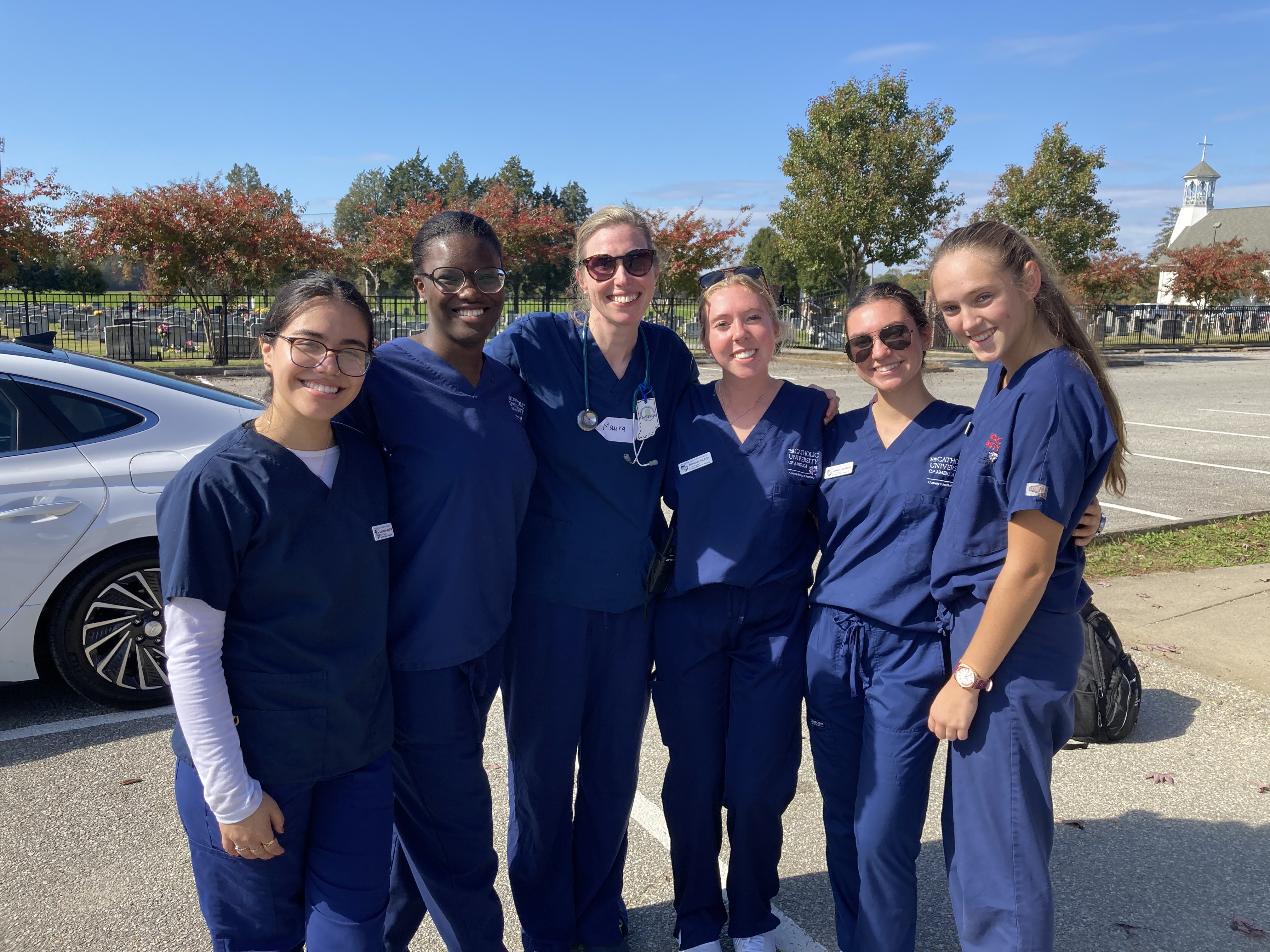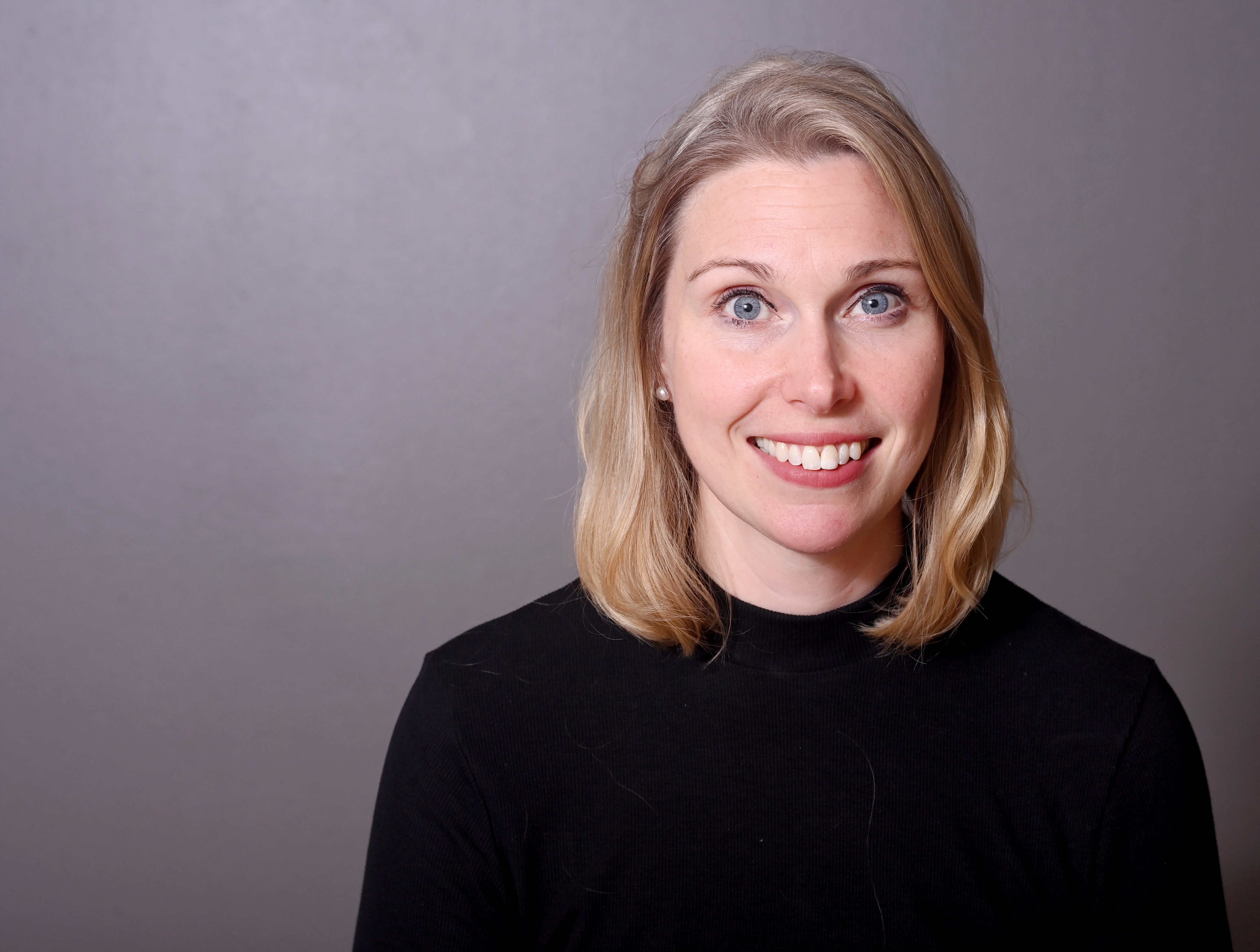What inspired you to join the nursing profession?
Maura Wenzel: When I was in high school I was torn between being a nurse or being a teacher. And then when I was a junior in high school, September 11th happened. And I was convinced that I would pursue nursing by seeing how big of a part the nurses and doctors played in New York during that time. It was a point in my life where I was debating how can I do the most amount of good for the most amount of people. And so I decided to go into the Navy and was commissioned into the Navy Nurse Corps.
How long were you in the Navy?
Maura Wenzel: I was on active duty for five years and I was in the reserves for three years after that. And while I was in the Navy, I was pretty lucky. I was stationed down in Norfolk first, then I was stationed in Naples, Italy, and I was able to travel all over Europe, then I deployed to Kuwait. And then when I came back, I was at Fort Belvoir in Alexandria, Virginia, and then I did all my reserve duty out of Fort Belvoir and Andrews Air Force Base.
How was the transition from being in the military to being a nurse outside of it?
Maura Wenzel: That's a fair question. When I was stationed in Italy, and as ironic as it sounds, I almost felt like I was losing my faith. And I know that sounds super weird considering how Italy and the Vatican are viewed as the center of the Catholic faith, but I was going to mass in Italian, and it wasn't the day and age that we are in now where you can get a five minutes homily on the internet. At that time, I felt like I wasn't getting a whole lot of spiritual nourishment, and I was there for a couple of years. And as I was looking at what I'd do when I got off active duty, I continued to want to help people. So, I got my master's degree in community and public health and I wanted to go to a place where I felt that my faith would be rejuvenated. When I started digging a little bit more deeply into it, I thought, wow, Catholic University is just amazing. It was everything I wanted it to be. For me, having the Basilica there, having all these chapels on campus, and having the capability of going to confession before classes helped me connect back with my faith. It was a pretty easy transition if I'm being honest. I was working also as a nurse at Nova Fairfax while I was in grad school.
How did you balance being a nurse and classwork? For students and alumni who are interested in doing grad school while being a full-time nurse do you have any advice?
Maura Wenzel: (laughing) So I wasn't married and I didn't have kids.
I'm just going to be straight. When I look back at my schedule I would work 3 to 4 shifts a week and I would schedule myself nights and weekends. Then I was free to do my classwork during the week. And then there's a clinical component as well with the master's degree that I got as a clinical nurse specialist degree. And so there's a certain number of hours that the DC Board of Nursing requires for that graduate degree. I had to figure out how to plan that with my shifts I think it would be much more difficult now that I’ve got three kids.
What is your role here at Catholic University and when did you start?
Maura Wenzel: So after I graduated, I went and pursued my doctorate here at Catholic University. My husband and I got married. We moved out to San Diego and I was acting as a clinical nurse specialist at UC San Diego for a couple of years. I then transitioned to a clinical nurse specialist who teaches nurses. And then I was able to transition to nursing faculty at a couple of universities out in San Diego. So I went from teaching nurses best practices to teaching nursing students the nuts and bolts of nursing. When we were moving back to the DC area a couple of years ago, I reached out to my doctoral advisor at Catholic University, Doctor Agazio. And I was like, "Hey, so I've now made this transition to teaching what's available in Southern Maryland that you know of?" And she said there are really no nursing schools in Southern Maryland. Would you like to teach here? And so I started two years ago. I started as an adjunct professor at first and I was teaching clinicals as well as doing clinical coordination. Now I do lectures and teach community and population health nursing for juniors.
You're teaching a new class this spring. What's that class and could you explain how it came to be?
Maura Wenzel: One of the things that came out from my teaching, not only in San Diego, but also here, was I had a lot of my students who were Christian, not necessarily Catholic, but who were concerned about how to live out your faith as a Christian in the healthcare industry. The questions I was receiving had to do with transgender patient care, wanting to have clarity on the topic of abortion and what I think would be called reproductive rights. I had a lot of my nursing students saying that they had been dealing with an ethical dilemma and they didn't know who to turn to. And so last year I talked to Dean Nolan and I said I think there's a need here. Students are looking for direction on how to live out their faith and still provide compassionate care to every single person. Because as Catholics we believe every person is made in the image and likeness of God and that they have an inherent dignity. So that raises the question: how do we prepare our students for that? We reached out to the theology department, the philosophy department, and the John Paul the Second Institute here on campus to help equip our nurses with the best possible information to help them go out into the world and maintain their faith and still practice. What came of that was the spring ethics seminar, which takes what the students are learning in their biomedical ethics courses and gives them a breakdown of how that applies to you as a nurse.
This class is a three-part seminar series where we have guest speakers who are subject matter experts to come in and assist in the lecture. There are also a couple of Nursing faculty who help me. We facilitate questions to help the students enrich the topics that they're listening to but also help them apply them in real-world scenarios. Our third seminar is a faculty panel, and it's specifically addressing student's concerns.
What makes CSON students special?
Maura Wenzel: What's special is they're wonderful students. I absolutely love my students. I think what is special specifically is that I have had so many students who are so unabashedly in love with Jesus. And most importantly, they want to serve Jesus by taking care of others. As a nurse, you’re working a 12-hour shift and you're seeing people at their absolute worst, and it's a really hard job to do if you can't see the spiritual and moral gift that each patient is to you. As a nurse, you have an opportunity to love like our Lord, and that patient has an opportunity to see our Lord's love shining through you. So I would say, what sets our students apart is that they do have that light inside them that they shine. I love my students and I always encourage them to live out their faith as best they can without judgment and to do so with reason and with compassion. That's why I find them to be very special.
Do you have any advice for CSON students who might be nervous about what life will be like after graduation?
Maura Wenzel: Yeah! Because this is another question I get a lot. It's super easy for us when we're here at Catholic. We hear the bells ringing. We know what when to go to mass. There's chapels at our disposal. And one of the things that I think the students are worried about after graduation is what happens when I lose my support system? What happens when I'm nursing? It's one thing to be with all my Catholic friends here, and what I say to my students is find your village. Find your faith village that supports you. Find other like minded Catholic nurses who are going to be going through the same transitions that you're going through and cling on to them and have really good discussion, even if you're just meeting for coffee once every couple of months or something. It’s important to have that friend who understands what it's like to be a Catholic nurse and to live out your faith in this day and age. One of the other things we're really looking at is how do we encourage our students to meet with each other after graduation. There's a National Association of Catholic Nurses, and there's also Curatio Apostolate of Catholic Health Care Professionals. And so at the Conway School of Nursing we are really looking at how can we give our students a sense of belonging to a Catholic health care professional club and how do we then facilitate them being able to stay active in it once they're alumni.


